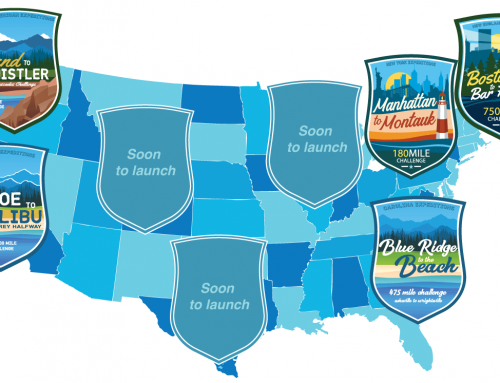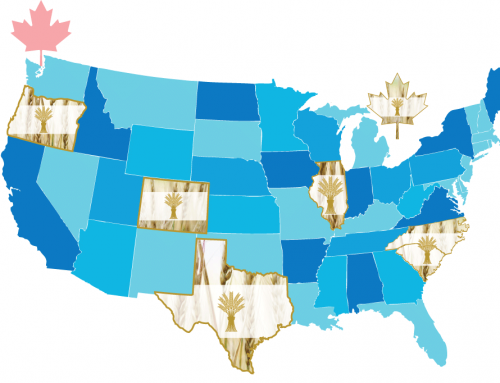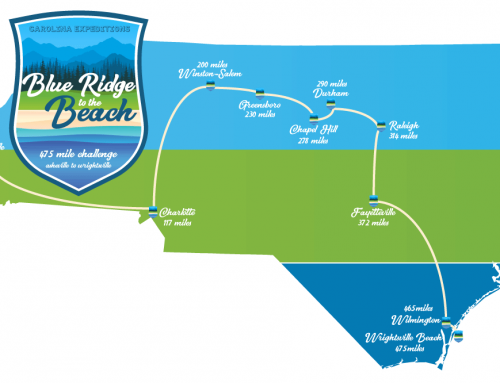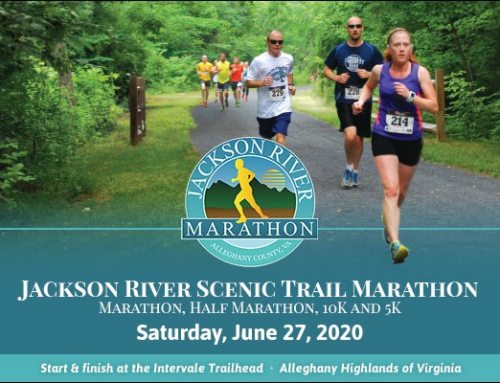
By D.C. Lucchesi
Charlie Engle knows about maintaining momentum. As an adventure racer and ultra-distance athlete, you can’t run across the country or another continent without being able to keep your focus on a finish line that could be weeks or even months away. But one of this Greensboro resident’s current challenges may never have a finish line: maintaining the public’s interest in H20 Africa, the charitable component of his historic run across the African continent. Even in the heat of summer training and racing in the Carolinas, the lack or absence of water is never a consideration. But to many in the heart of Africa, it is a striking reality. Engle’s epic run and Africa’s enduring water crisis are documented in the new film Running the Sahara. The film, narrated and produced by Oscar-winner Matt Damon, is being showcased primarily at major marathons until the end of the year. An advance screening in Charlotte gave us the opportunity to talk to Engle about the film and the effort to access water in Africa.
ENDURANCE: How’s the film tour going so far?
ENGLE: It’s awesome, really. There are probably 25 or so dates this year. We’re selling a lot of the DVD’s, the downloads are going great, and honestly, these events aren’t really rainmakers so much as they are about spreading the word.
ENDURANCE: You’ve said that the running community has been very supportive of the effort. If that’s like preaching to the choir, how will you spread the word to the “unchurched”?
ENGLE: That’s part of our goal. And what I usually tell people is, look, this isn’t just a running movie… yes there’s running involved, but that’s not what it’s all about. I do believe, though, that if all we ever did was reach the running and triathlon community, we’d reach a huge group of people with this story. I mean, if I was to tell someone ten years ago that I was running a marathon, most of the time, you’d get a response like, ‘I don’t even like to drive my car that far.’ Today, you tell someone you’re running a marathon, there’s a solid 50-50 chance they’ll say, ‘oh yeah, I did one last year, or I’ve done three, or I’d like to do one.’ They’re not going to say, ‘you’re crazy,’ or anything. That’s a real big change.
ENDURANCE: About the issue of the water crisis in Africa. Is that something that you had in mind before you started the run, or something that came along organically during the run?
ENGLE: The water issue really came about around a year before the run. I went over to Africa to scout out the route. I’m in this village with like, about 100,000 people that should have had about 20,000 in it. It’s because all of these nomadic people are being forced into these villages. And there are all these aid agencies over there dealing with HIV, malaria and what have you, but no one’s dealing with the water issue. That’s where the natural relationship between being a runner and needing water really made sense. Ultimately, Matt Damon and his involvement became critical. Having his name attached to it has really allowed us to raise a lot of money and awareness. A lot of the money we’ve raised – about six million dollars so far – has been not only for water, but also for sanitation. In that part of the world, it’s often rare that someone has that connection.
ENDURANCE: The release of Running the Sahara and the film’s tour are going to help reenergize efforts around the water crisis in Africa. How do you hope to sustain the momentum for this issue?
ENGLE: For me, it’s about finding another project. I haven’t personally come to terms with it, like, ‘now I’m whole, or whatever.’ For me, the moving on or maintaining that momentum is about finding the next challenge, or goal or project. Sustaining is does mean putting myself back out there. And I’ll tell you, the more people hear this story about the Sahara, I guarantee you, there were at least ten people in that theatre tonight who are going home and deciding that they’re going to do something that they didn’t plan on doing. And for me, it’s like that, too.
ENDURANCE: Most of us have never been without water. Even with the moderate to extreme drought conditions that we faced in North Carolina and many other parts of the U.S. last year, we were never more than mildly inconvenienced. Do you think it’s hard for us here to understand what it’s truly like to be without water or how they could make a difference?
ENGLE: It’s a difficult concept, for sure. Here’s what I was telling a class at an inner-city school about the issue and the water problem. I asked them if they really thought it made any difference if they cut their shower short or didn’t run the water while they brushed their teeth. They all said, ‘no, not really.’ Then I asked them if one vote would or could make a difference in an election. Of course, they all said, ‘yes!’ So the kids understand the concept that one person can make a difference, they – and we all do – need to learn to apply that lesson to personal conservation. To use the “ultra” terminology, we’ll eventually get there; it’s just going to take some pain and suffering.
Engle and the film will be back in the Carolinas this fall for screenings at Raleigh’s City of Oaks Marathon and Charlotte’s Thunder Road Marathon. A DVD copy of Running the Sahara can be purchased or downloaded online at http://www.runningthesahara.com/.
# # #
D.C. Lucchesi runs, rides, and writes in Charlotte, NC, with the support of his family and the generous assistance of the folks at New Balance, Fuel Belt, Body Glide, and Run for Your Life. D.C. can be reached at dc@runforyourlife.com.






